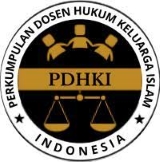Masks in the Form of Memorization of the Qur'an: An Analysis of the Fatwa of Al-Lajnah Ad-Dāʽimah Li Al-Buhūṡ Al-ʿIlmiyyah wa Al-Iftā' Perspective of Norm Enhancement Theory
Abstract
The practice of handing over the mascot in the form of memorizing the Qur'an in a marriage contract has given rise to an interesting legal discourse in the realm of contemporary fiqh. One of the religious authorities that has responded to this phenomenon is Al-Lajnah Ad-Dāʽimah Li Al-Buhūṡ Al-ʿIlmiyyah wa Al-Iftā', a leading fatwa institution in Saudi Arabia. This study aims to examine in depth the fatwa issued by the institution regarding the validity of memorizing the Qur'an as a form of mascot, by tracing the basics of legal istinbāṭ, the relevance of the sharia postulates used, and the socio-religious context behind this view. The method used in this study is a qualitative approach with normative and descriptive analysis. This study concludes that the mascot in the form of memorization or teaching of the Qur'an is permissible in Islamic law, as affirmed in the fatwa of Al-Lajnah Ad-Dāʽimah number 6029. This fatwa allows the form of non-material mascot in conditions of financial incapacity. However, from the perspective of ushul fiqh, the fatwa approach is considered too textual (monotext) and does not reflect the integration between partial postulates, general principles of sharia, and basic Islamic values. Thus, non-material monogamy such as the teaching of the Qur'an is not only legally valid, but also reflects the spirituality, simplicity, and principle of agreement in marriage, as long as it is understood within the framework of intact and contextual sharia norms.
Keywords
Full Text:
PDFReferences
‘Abdurrah}man al-Jazi>ri>, al-Fiqh ‘ala> al-Maza>hib al-‘Arbaʽah, (Beirut: Da>r al-Fikr, 1409 H), IV: 94. Abd Sattaril Haq, ‘Islam Dan Adat Dalam Tradisi Perkawinan Masyarakat Suku Bugis: Analisis Interaksionisme Simbolik’, Al-Hukama’: The Indonesian Journal of Islamic Family Law 10, no. 2 (2020): 349–71. https://doi.org/10.15642/alhukama.2020.10.2.349-371 Abdul Rahman Ghazali, Fiqih Munakahat, (Jakarta: Kencana, 2003), hlm. 84. Abdul Wahhab Khallaf, Ilmu Ushul Fiqh, alih bahasa Moh. Zuhri dan Ahmad Qarib, (Semarang: Dina Utama, 1994), hlm. 2. Abu> Da>wud Sulaima>n Ibn al-Asy'as As-Sijista>ni>, Suna>n Abi> Da>wud, (Riyadh: Maktabah al-Ma’a>rif, 1424 H), hlm. 365. “Kita>b an-Nika>h},” “Ba>b as-S}ada>q.” Hadis dari ‘Abdullah Ibn Muh}ammad an-Nufaili>, dari ‘Abd al-‘Azi>z Ibn Muh}ammad, dari Yazi>d Ibn al-Ha>d, dari Muh}ammad Ibn Ibra>hi>m, dari Abi> Salamah. Hadis ini sahih. Ah}mad as-S}a>wi>, Bulgah as-Sa>lik li al-Aqrab al-Masa>lik, in Ibn Irawan, "Study of Fatwa Al-Lajnah Al-Daimah Li Al-Buhus Al-Ilmiyah Wa Al-Ifta': Criticism of the Prohibition of Marriage Dowry in the Form of Memorization of the Qur'an," Codification: Journal of Islamic Research, Vol 13:2, (2019), pp. 308-309. Retrieved May 8, 2023. Ahmad Yajid Baidowi, 'Analysis of the Regulation of the Iddah Period for Men in the Counter Legal Draft of the Compilation of Islamic Law (CLD-KHI) Article 8 Paragraph 1 of the Prefective of Islamic Fiqiih', El-Ahli: Journal of Islamic Family Law 3, no. 2 (2022): 161–80. https://doi.org/10.56874/el-ahli.v3i2.959 Ahmad Zayyadi, ‘Good Governance Dalam Perspektif Hukum Islam Kontemporer (Tinjauan Usul Fikih Dari Teori Pertingkatan Norma)’, Al-Manahij: Jurnal Kajian Hukum Islam 11, no. 1 (2017): 13–34. https://doi.org/10.24090/mnh.v11i1.1265 al-Lajnah Da>ʽimah li al-Buhu>s} al-‘Ilmiyyah wa al-Ifta>’, Fata>wa> al-Lajnah Da>ʽimah li al-Buhu>s} al-‘Ilmiyyah wa al-Ifta>’, (Riyadh: Da>r al-Muayyid, 1424 H), XIX: 35-36. Bima Ahadi and Siti Djazimah, 'Safeguarding Religion and Reason Through Marriage Procession: Memorization of Qur'anic Verses as a Marriage Dowry', Al-Ahwal: Islamic Family Law Journal 13, no. 2 (2020): 153–62. https://doi.org/10.14421/ahwal.2020.13205 Budi Juliardi et al., Metode Penelitian Hukum (CV. Gita Lentera, 2023). hlm. 1-33. Budi Ruhiatudin, Introduction to Law, (Yogyakarta: Cakrawala Media, 2013). hlm. 8. David Tan, 'Legal Research Methods: Exploring and Reviewing Methodology in Conducting Legal Research', Nusantara: Journal of Social Sciences 8, no. 8 (2021): 246-378. Derita Prapti Rahayu, M SH, and Session Ke, 'Legal Research Methods', Yogyakarta: Thafa Media, 2020. hlm. 1-15. Dina Mariana Inwasef, ‘Pengaruh Mas Kawin Terhadap Pernikahan Kudus Dalam Keluarga Kristen’, EIRENE: Jurnal Ilmiah Teologi 6, no. 2 (2021): 324–43. Eko Setiawan, ‘Larangan Pernikahan Weton Geyeng Dalam Adat Jawa’, Journal of Urban Sociology 5, no. 2 (2022): 81–90. http://dx.doi.org/10.30742/jus.v5i2.2431 Halil Khusairi, ‘Kompleksitas Kawin Siri: Antara Hukum Islam Dan Undang-Undang Perkawinan Di Indonesia’, Istinbath 21, no. 1 (2022): 165–88. https://doi.org/10.20414/ijhi.v21i1.492 Ibn Irawan and Jayusman Jayusman, 'Mahar Memorization of the Qur'an and Islamic Law Perspective', Palita: Journal of Social Religion Research 4, no. 2 (2019): 121–36. https://doi.org/10.24256/pal.v4i2.804 Ibnu Irawan, Jayusman Jayusman, and Agus Hermanto, ‘Studi Fatwa Al-Lajnah Al-Daimah Li Al-Buhus Al-Ilmiyah Wa Al-Ifta’: Kritik Atas Larangan Mahar Pernikahan Berupa Hafalan Al-Qur’an’, Kodifikasia 13, no. 2 (2019): 299–320. https://doi.org/10.21154/kodifikasia.v13i2.1834 Kompilasi Hukum Islam tentang Perkawinan, Pasal 2. Direktorat Jenderal Bimbingan Islam, Kompilasi Hukum Islam di Indonesia, (Jakarta: Kementerian Agama RI, 2018), hlm. 5. Leo Perkasa Maki, ‘Kedudukan Dan Hikmah Mahar Dalam Perkawinan’, Syakhshiyyah Jurnal Hukum Keluarga Islam 2, no. 2 (2022): 137–49. https://doi.org/10.32332/syakhshiyyah.v2i2.6138 Lili Rasyidi, Hukum Perkawinan dan Perceraian di Malaysia dan Indonesia, (Bandung: PT. Remaja Rosdakarya, 1991), hlm. 51. Maria Farida Indrati, Ilmu Per-Undangan, (Yogyakarta: Kanisius, 2007), hlm. 41. Moh Mufid, Ushul Fiqh Contemporary Economics and Finance: From Theory to Application (Kencana, 2018). hlm. 1-44. Muh}ammad bin Isma>’i>l al-Bukha>ri>, S}ah}ih} al-Bukha>ri>, (Beirut: Da>r ibn Kas}i>r, 2002), hlm. 310, hadis nomor 1283, “Kita>b an-Nika>h},” “Ba>b Man Lam Yastat}i’ al-Ba>’ata Falyas}um.” Hadis dari ‘Umar ibn H{afs} Ibn Giya>s||, dari Abi>, dari al-A’masy, dari ‘Uma>rah, dari ‘Abd ar-Rah}man Ibn Yazi>d, dari Abdullah. Hadis ini sahih Muh}ammad bin Isma>’i>l al-Bukha>ri>, S}ah}ih} al-Bukha>ri>, (Beirut: Da>r ibn Kas}i>r, 2002), hlm. 1312-1313, hadis nomor 5149, “Kita>b an-Nika>h},” “Ba>b at-Tazwi>j ala> al-Qur’a>n wa Bigairi S}ada>q.” Hadis dari ‘Ali> Ibn Abdillah, dari Sufya>n, dari Aba> H}a>zim, dari Sahl Ibn Sa’d as-Sa>’idi>. Muh}ammad Ibn Ah}mad Ibn Rusyd, Bida>yah al-Mujtahid wa Niha>yah al-Muqtas}id, translated by Imam Ghazali Said and Achmad Zaidun, (Jakarta: Pustaka Amani, 2007), II: 432. Muh}ammad Ibn Ah}mad Ibn Rusyd, Bida>yah al-Mujtahid wa Niha>yah al-Muqtas}id, II: 433. Muhammad Jafar, Hukum Hafalan Al-Qur’an Dan Hadis Sebagai Mahar Nikah (Yayasan Penerbit Muhammad Zaini, 2022). Muhammad Ridwan, ‘Kedudukan Mahar Dalam Perkawinan’, Jurnal Perspektif 13, no. 1 (2020): 43–51. Mus}t}afa> Sa ́i>d al-Khin, Abh}a>s H}aula Us}u>l al-Fiqh al-Islami>, Ta>ri>h}uhu wa Tat}awwuruhu, (Damascus: Da>r al-Kalam at-T}ayyib, 1420 H), hlm. 56. Nadia Ananda Putri et al., ‘Kedudukan Uang Panaik Sebagai Syarat Perkawinan Dalam Adat Suku Bugis Menurut Hukum Islam’, Bhirawa Law Journal 2, no. 1 (2021): 33–44. https://doi.org/10.26905/blj.v2i1.5852 Nurul Qamar and Farah Syah Rezah, Legal Research Methods: Doctrinal and Non-Doctrinal (CV. Social Political Genius (SIGn), 2020). hlm. 2-12. Ratna Komala and Misbah Khusurur, 'A Review of Islamic Law on the Implementation of Dowry Giving in the Form of Ta'lim Ayat Al-Qur'an', Al-Wasith Journal: Journal of Islamic Law Studies 7, no. 2 (2022): 1–15. https://doi.org/10.52802/wst.v7i2.753 S Hi Zakyyah, ‘Status Nafkah, Maskan, Dan Kiswah Bagi Istri Yang Ditalak BᾹ’in Sugra’, 2017. hlm. 2-13. Salman Al Farisi and Siti Maqfiroh, ‘Pandangan Penghulu Terhadap Pemberian Mahar Berupa Hafalan Al-Qur’an Perspektif Hukum Islam (Studi Kasus KUA Di Surabaya)’, MAQASID 11, no. 2 (2022): 94–103. Selfisina Tetelepta, Robby Sugara Sianipar, and Sifra Parama, ‘Perempuan Papua Dan Mas Kawin; Suatu Tinjauan Feminisme Poskolonial’, Pute Waya: Sociology of Religion Journal 2, no. 2 (2021): 36–47. Soejono Soekanto, 'Legal Research Methods', 2003. hlm. 1-34. Syamsul Anwar, "The Theory of Norm Enhancement in Fiqh Proposal", hlm. 162. Syamsul Anwar, “Teori Pertingkatan Norma dalam Usul Fikih”, Asy-Syir’Ah Jurnal Ilmu Syari’ah Dan Hukum, Vol. 50:1, (Juni 2016), hlm. 160-161. Diakses pada 7 Mei 2023. https://doi.org/10.14421/ajish.v50i1.167 Syamsul Anwar, 'Theory of Norm Enhancement in Fiqh Proposal', Ash-Syir'ah: Journal of Sharia and Law 50, no. 1 (2016): 141–67. Syofyan Hadi, Tafsir Qashashi, (Serang: A-Empat, 2021), II. hlm. 126. Husnul Fatarib, "Basic Principles of Islamic Law (Study of the Flexibility and Applicability of Islamic Law)," Nizam, Vol. 4:1, (January-June, 2014), p. 70. Retrieved May 8, 2023. Umar Haris Sanjaya and Aunur Rahim Faqih, Islamic Marriage Law in Indonesia, (Yogyakarta: Gama Media, 2017), hlm. 45. Umar Haris Sanjaya and Aunur Rahim Faqih, Islamic Marriage Law in Indonesia, hlm. 44. Wahbah Az-Zuh}aili>, al-Fiqh al-Isla>mi> wa Adillatuh, alih bahasa Abdul Hayyie al-Kattani, (Jakarta: Gema Insani, 2010). IX: 39. Waryani Fajar Riyanto, ‘Pertingkatan Kebutuhan Dalam Maqasid Asy-Syariah (Perspektif Ilmu Ekonomi Islam Kontemporer)’, Jurnal Hukum Islam 8, no. 1 (2010): 44–63. https://doi.org/10.28918/jhi.v8i1.582 Yuni Harlina, ‘Tinjauan Usia Perkawinan Menurut Hukum Islam (Studi UU No. 16 Tahun 2019 Perubahan Atas UU No. 1 Tahun 1974 Tentang Perkawinan)’, Hukum Islam 20, no. 2 (2020): 219–38. http://dx.doi.org/10.24014/jhi.v20i2.9786 Yusdian Lumbon, Ermin Alperiana Mosooli, and Oskar Sopang, ‘Nilai Pengantin Perempuan Dalam Mas Kawin Suku Banggai Ditinjau Dari Konsep Imago Dei Dalam Kejadian 1: 26-27’, Jurnal Misioner 1, no. 1 (2021): 41–59. https://doi.org/10.51770/jm.v1i1.3 Zainuddin Ali, Legal Research Methods (Sinar Grafika, 2021). hlm. 2-30.
DOI: https://doi.org/10.24952/almaqasid.v11i1.15341
Refbacks
- There are currently no refbacks.
Copyright (c) 2025 Jurnal AL-MAQASID: Jurnal Ilmu Kesyariahan dan Keperdataan

This work is licensed under a Creative Commons Attribution-ShareAlike 4.0 International License.



2.gif)


















